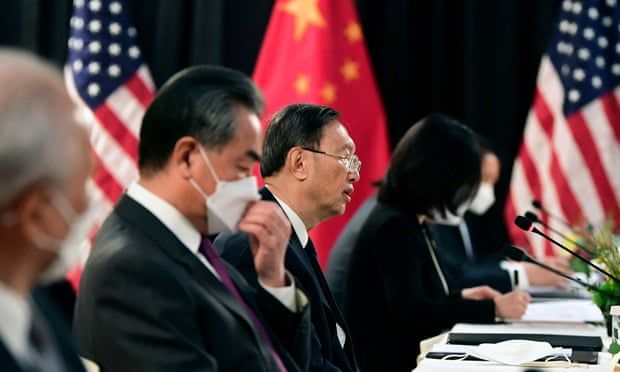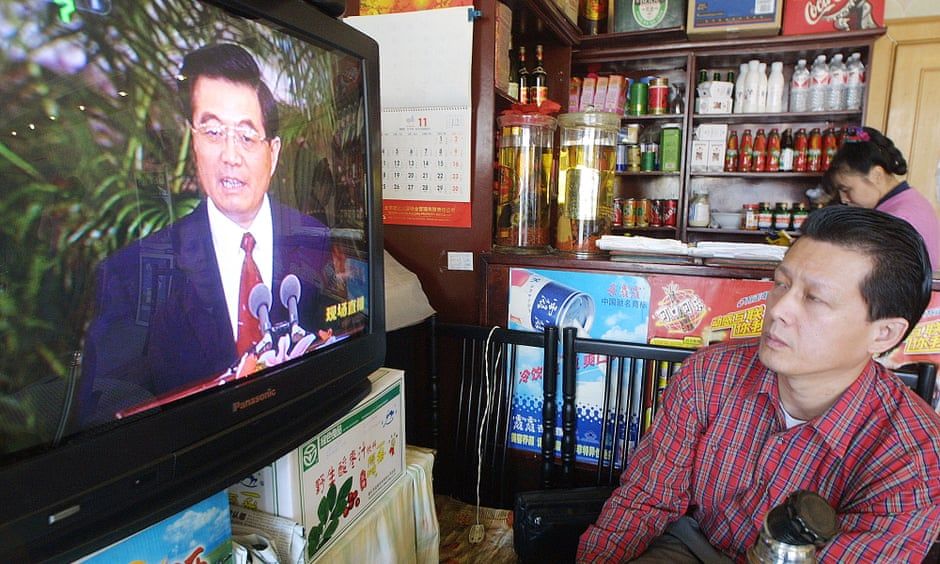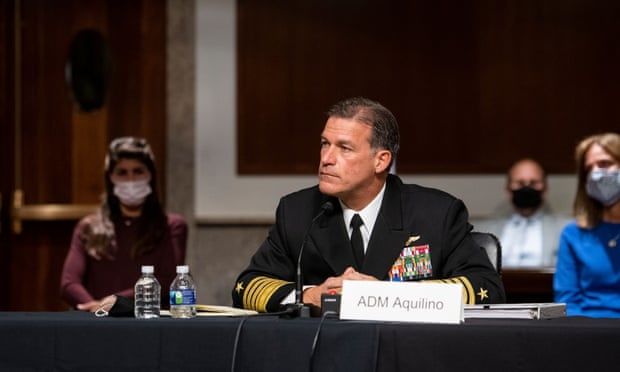Hong Kong News

Is China stepping up its ambition to supplant US as top superpower?
It may have been an inelegantly, even ineptly, executed pivot, gratuitously alienating key allies, but by leaving Afghanistan and forming the Australian, US and UK security pact in the Indo-Pacific, Joe Biden has at least cleared the decks to focus on his great foreign policy challenge – the systemic rivalry with China.
Yet the concern now is how quickly this rivalry could escalate, especially in Taiwan. The linchpin of the US alliance system in south-east Asia, Taiwan is the biggest island in the “first island chain”, the group of islands that keeps China blocked in. It is China’s next target, and as the former British prime minister Theresa May pointed out, no one quite knows if the west is prepared to fight to save Taiwan or whether the new tripartite pact in some way places a new obligation on the UK to come to the country’s defence.
Chinese nationalist outlets, enthusiastic chroniclers of the end of the American empire, have certainly interpreted the US pullout from Afghanistan through the prism of Beijing’s claim on Taiwan. The Global Times predicted that Afghanistan showed that in the event of a war in the strait, Taiwan’s defence would “collapse in hours and the US military will not come to help”. The US, it said, had shown it did not have the stomach for a fight.
US policy for 40 years has been one of strategic ambiguity leaving unanswered what the it might do in the event of an invasion. Tracts predicting conflict with China have been pouring out for decades. In what is often called the bible of the modern China threat school, Richard Bernstein and Ross Munro warned of The Coming Conflict with China as early 1997.
Since then whole libraries have been filled discussing this theme, including one by Ian Easton mapping how the invasion would pan out hour by hour. Jean-Pierre Cabestan, the author of Demain la Chine: guerre ou paix?, has been writing about a possible invasion of Taiwan for nearly two decades.
He worries if a turning point has been reached. “Beijing’s project becomes a little more obvious every day – to become the world’s leading power and so dethrone Washington from its pedestal, dominate east Asia and thus oust America from the western Pacific,” he writes. “The PLA [People’s Liberation Army] is preparing a little more every day for an armed conflict with Taiwan”, he adds.
The former Australian prime minister Kevin Rudd notes that with Hong Kong firmly in its grip, China sees Taiwan as its unfinished business. “I think what we’ll then be moving into is a period in which China will be looking at its options to leverage Taiwan back into a form of a political union with China by the time we get to the late 2020s and into the 2030s,” Rudd said recently on CNBC. “And that’s when I believe it does get dangerous for us all”.
At a confrontation between Chinese and US officials in Alaska in March, White House officials were left struck by the strength of the lecture on Taiwan by Xi Jinping’s top foreign policy aide, Yang Jiechi.
 The
Chinese delegation led by Yang Jiechi, centre, speak with their US
counterparts at the opening session of US-China talks in Anchorage in
March.
The
Chinese delegation led by Yang Jiechi, centre, speak with their US
counterparts at the opening session of US-China talks in Anchorage in
March.
Soon after, Xi inspected Fujian province, across the strait from Taiwan. In June Yang followed this up with a call to the US secretary of state, Antony Blinken, telling him: “The Taiwan question concerns China’s sovereignty and territorial integrity, and involves China’s core interests. There is only one China in the world and Taiwan is an inseparable part of China.” Chinese planes in recent months have stepped up incursions into Taiwan’s air defence zone.
Last week Blinken reiterated the US’s commitment to helping Taiwan defend itself. It would be a “serious mistake for anyone to try to change the existing status quo by force”. Kurt Campbell, the White House Asia director, said an invasion would be catastrophic.
Taiwan has begun to realise it needs to do more to protect itself. It is to spend an extra $8.7bn (£6.4bn) on defence over the next five years, including on new missiles. This is necessary, argues Tanner Greer, a scholar on Taiwan, because the Taiwanese have in effect given up on training draftees and its military command is isolated and outmoded. He adds that unless Taiwan mobilises its society, the US cannot provide a defence guarantee. It would be too hard a domestic sell for the White House. A Chicago Council poll in August found only 46% favoured explicitly committing to defend Taiwan if China invaded, even if a far larger number 69% supported US recognition of Taiwan.
The key debate is about China’s true intentions, its timeframe and the depth of its resolve to assert its claim, including over Taiwan.
“There are those that say China has aggressive intentions and global ambitions, and is acting on those global ambitions because that is what great powers do and as they get more powerful they get more ambitious,” said David Edelstein, the author of Over the Horizon, a study of how declining and rising powers interact. “Another school of thought sees this as a classic security dilemma in international relations. Both the US and China are seeking to secure their interest, and in the process threaten others. A third argument believes China is really motivated by domestic security. What matters most to Chinese leadership is that it wants a world that is safe for Chinese authoritarianism, and as long that it is safe, they do not have much ambition beyond that.”
Within US government circles, concern about China’s intentions has only grown. The thesis expounded by Barack Obama, that the US could use its power to nudge and reassure China towards better behaviour, no longer holds sway.
An example of the latest thinking comes from Rush Doshi, serving as director for China on the Biden administration’s national security council (NSC). Before he took up his post he completed his now-published analysis The Long Game: China’s Grand Strategy to Displace the American Order.
Doshi detected three strategies, each based on evolving perceptions of the American threat. The first 20-year period started with the end of the cold war, the collapse of the Soviet Union, the Gulf War and Tiananmen Square and was dedicated to blunting sources of American power.
Then after the 2008 financial crash, Beijing, confident the US model was flawed, shifted to building foundations for a Chinese order within Asia. This was set out best by the then president, Hu Jintao, at China’s 11th ambassadorial conference in 2009. Hu declared that there had been “a major change in the balance of international forces” and that China now had to “actively accomplish something”.
 A restaurant owner watches after Hu Jintao was named general secretary of China’s Communist party in 2002.
A restaurant owner watches after Hu Jintao was named general secretary of China’s Communist party in 2002.
It moved away from mines and missiles, and invested in aircraft carriers and amphibious vehicles. It militarised islands in the South China Sea. It began building more surface ships for its navy. At the political level, China switched its focus away from participating in international organisations to blunt US influence. Instead, it started to launch its own initiatives, such as the Asian Infrastructure Investment Bank, and belt and road.
The third and current era is described as “great changes unseen in a century”. This, according to Doshi, coincided with Donald Trump’s election and Brexit in 2016, symbolising a breakup of the western political engine. The global order is once again at stake because of unprecedented geopolitical and technological shifts. For Doshi this strategy requires China projecting new leadership and advancing its norms at institutions such as the United Nations, turning the Chinese military into a world-class expeditionary force with bases across the globe and solidifying China’s place at the centre of global supply chains. It also implicitly accepts that the opportunities to overtake the US surpass the risks.
“China can already look at the world on an equal level,” Xi told the annual legislative sessions in Beijing in early March, a remark widely interpreted in Chinese media as a declaration by the president that China no longer sees the US as a superior force.
The stark strategic frame through which Doshi and other Biden policy analysts view China’s intentions is shared by key military commanders.
Speaking to the Senate armed services committee in March, Adm Philip Davidson, at the time heading the US Indo-Pacific Command, put a stark timeframe on a potential invasion, saying: “I think the threat is manifest during this decade – in fact, in the next six years.”
He added: “I worry that they’re accelerating their ambitions to supplant the United States and our leadership role in the rules-based international order, which they’ve long said that they want to do by 2050. I’m worried about them moving that target closer.”
Testifying to the same committee, Davidson’s successor, Adm John Aquilino, gave no date for the expected confrontation, but said pointedly: “My opinion is this problem is much closer to us than most think. And we have to take this on, put those deterrence capabilities like [Pacific Deterrence Initiative] in place, in the near term and with urgency.”
 Adm John Aquilino at a Senate armed services committee hearing in March.
Adm John Aquilino at a Senate armed services committee hearing in March.
Davidson has since expanded on his view about the imminence of the threat to Taiwan. “The changes in the [People’s Liberation Army]’s capabilities, with their missile and cyber forces, and their ability to train, advance their joint interoperability and their combat support logistics, all those trend lines indicate to me that within the next six years they will have the capability and the capacity to forcibly reunify with Taiwan, should they choose force to do it.
“At the same time, within the next six years, it is clear to me that China is pursuing an all-of-party approach that seeks to coerce, corrupt and co-opt the international community in a way in which they may be able to achieve their geopolitical edge, in what some describe as ‘the hybrid zone’ or ‘the grey zone’ or the ‘three warfares’ or ‘lawfare’, any of those things, to force Taiwan to capitulate because of extreme diplomatic [and] economic pressure and strain.”
It is this kind of assessment that explains the diplomatic risks Biden was prepared to run in forming the new tripartite security pact. He says the pact and the Afghan withdrawal have to be seen as one. If the Indo-Pacific is critical to 21st century, and the US believes China is seeking global supremacy, Biden needed a credible answer to the Chinese threat manifested most immediately towards Taiwan.
The Taiwanese navy says the logical area for deployment of the pact’s nuclear submarines will be in the deep waters of the western Pacific near Taiwan. As such it is a message of intent to China that whatever the formalities, the US will seek to defend it.











